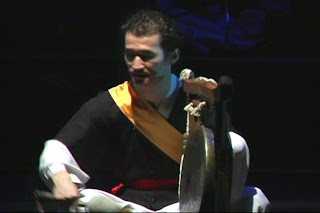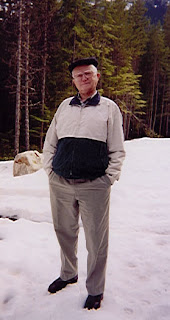I have a bunch of cool/fun/quirky pictures waiting on file to post, but it just seems a little trite to post them with these things -- kind of like those newscasts that give 40 minutes of "People are dying, unhappy, and exploitative. . . but a fireman saved a cat from a tree on Dreyden Street this afternoon, and a camera crew was there to catch the scene. . . "
The problem with reading the newspaper is exactly this: It's not newsworthy to report "54 999 999 Koreans respected their national monuments today" or "299 999 999 Americans' behaviour respected and valued human life, more or less" -- news like that would be quite heartening, but dishonest. As always, the worst elements of human nature are usually also the noisiest (think religious extremists, obnoxious protesters, not to mention the nastiness that gets into the news) and its the news agencies' responsibility to report that nasty. Yeah, I'm human too, so I forget the 199 people who rode the subway with me courteously, or at least neutrally, and I only remember the single jackass who pushed me and nearly stopped me from getting off the train on time, because he was plowing for that empty seat on the bench, and didn't care who he had to offend to get it.
So I need to remember the 99.9%, even as I read in the paper about the 0.1%.
I went down to the destroyed gate again on Friday (the other pictures were from Monday).
They have a slightly more permanent, and higher, barrier around the burnt gate now.

 It's still a very crowded scene -- mostly older generations.
It's still a very crowded scene -- mostly older generations.
In fact, I chatted (across the language barrier) with an older gentleman who came to see the gate all the way from Gwangju in South Jeolla province, about a four and a half hour drive.
They had made a shrine, laid it out in the way of an ancestral shrine, or a memorial for the dead, where people lay down flowers and pay tribute to the dead by laying out flowers and bowing. Flowers were available on site.

They found a picture of the gate from maybe the '50s or '60s. If it were a shrine for a human, that mat would be laid out with food, but gates don't eat anything.
 This guy stood sentry, and occasionally played sad tunes on a traditional Korean flute. I don't know the significance of the songs -- there's a high probability they're funereal folk songs or something, but it sure set a tone.
This guy stood sentry, and occasionally played sad tunes on a traditional Korean flute. I don't know the significance of the songs -- there's a high probability they're funereal folk songs or something, but it sure set a tone.


The sign boards are not an ancient tradition. This comes from something a little more recent -- when a popular Chinese movie star committed suicide just before his movie came out in theatres, at the mall, somebody placed a sign board like this next to the cardboard display promoting the movie. People were signing it and putting flowers on the ground in the front of the sign, not unlike this.


 Things were more organized than on Monday -- a church group, or maybe a heritage group, had a tent up, and they were serving hot drinks. The shrine had been set up, the barrier around the gate's ruins were better built and more permanent. On the other side of the courtyard, were these guys. (Note the one in traditional Korean clothing -- the tall hat and such.)
Things were more organized than on Monday -- a church group, or maybe a heritage group, had a tent up, and they were serving hot drinks. The shrine had been set up, the barrier around the gate's ruins were better built and more permanent. On the other side of the courtyard, were these guys. (Note the one in traditional Korean clothing -- the tall hat and such.) The one in the tall hat kept talking through a loudspeaker. Now I'm not exactly sure what they were doing, but I'm pretty sure they weren't religious soapboxers (good thing, too -- I can't think of a less appropriate place to lay down platitudes on a loudspeaker [drowning out the lovely flute dirges, no less] than the site of a tragedy). I'm not sure yet how I feel about these guys, because I don't know what they were here for.
The one in the tall hat kept talking through a loudspeaker. Now I'm not exactly sure what they were doing, but I'm pretty sure they weren't religious soapboxers (good thing, too -- I can't think of a less appropriate place to lay down platitudes on a loudspeaker [drowning out the lovely flute dirges, no less] than the site of a tragedy). I'm not sure yet how I feel about these guys, because I don't know what they were here for. There's the loudspeaker. If anybody reading this knows what the sign says, please tell me -- I'm very curious. If they were calling for better heritage protection, then I don't mind their presence (though their method -- obnoxious loud speaker -- is still in my bad books), but if it was some other cause -- Anti-Free-Trade-Agreement or somesuch axe-grinder, then I shall be officially (and retroactively) upset and offended on behalf of all the mourners at the gate.
There's the loudspeaker. If anybody reading this knows what the sign says, please tell me -- I'm very curious. If they were calling for better heritage protection, then I don't mind their presence (though their method -- obnoxious loud speaker -- is still in my bad books), but if it was some other cause -- Anti-Free-Trade-Agreement or somesuch axe-grinder, then I shall be officially (and retroactively) upset and offended on behalf of all the mourners at the gate.
In fact, if anyone reading this knows Korean, I'd really appreciate if you put an explanation in the post. -- I've been told it's protesting that the district office (one of the administrations that could be partly held responsible for the accident) is hopelessly useless.
As I said, a lot of older folks were there. The one with the hat and the fantastic mustache was barking, rabble-rousing -- I wonder what he was saying, but he was definitely the coolest-looking of the demagogues out there soapboxing (with the possible exception of the guy by the truck with the microphone and the traditional garb.)

And, right across the street from Namdaemun/Sungnyemun gate, a little irony: at least they won't have to travel far to get the insurance details sorted out after the fire.
(It says Dae Han Fire & Marine Insurance)

If you're really curious to see it, here's a video. I like this one because it's just the actual sound, without newscasters' narration.
The collapse is shocking, and all this aired on live TV.
In fact, in their emotional shock, some Koreans called this the Korean 9/11, which is a little overboard
This site pointed out the it's not the first disaster Koreans have experienced, and this guy states, a bit more emphatically, that the Korean media lost all perspective this time. I wrote this on his comment board after he took Korean papers and pundits to task:
"Sure, the media's overreacting -- but you know, hyperbole is, like, the greatest invention ever in the history of anything ever!!!!!!
. . .
I see the 9/11 parallel insofar as
1. it had the same "I can't believe my eyes" kind of shock value,
2. something fell in a big cloud of smoke and ashes,
3. it was broadcast as it happened on live TV
4. it was COMPLETELY unexpected
5. it hit Korea "where it hurts" the same way the NYC attack hit America where it hurt
6. everybody was sad and stunned the next day.
However, that's where the parallels end -- my shocked emotion watching the gate go down was the same disbelieving feeling I felt when I watched the Twin Towers fall, in the same way that constipation and intestinal cancer are both bowel problems.
When Sungnyemun collapsed, here are things that DIDN'T happen, unlike after 9/11, for Muslims and Americans:
1. older men didn't stay home for fear of street violence and reprisals, and none were threatened or bullied at work
2. no pojang machas [outdoor restaurants, common hangouts for older Korean men -- same demographic as the arsonist] or soju tents were firebombed or vandalized
3. there were no videos of self-hating second generation Korean immigrants celebrating in the streets of LA (the way there was video of street celebrations in certain America-hating countries and districts)
4. Korea will not go to war because of this
5. no anarchist, or hate-founded organization was found responsible for the attack, and found to have intentions to continue with other attacks
6. no televangelist blamed the attack on their country's tolerance of gays
7. 3000+ people didn't freaking die!
Meanwhile, let's go easy on Korea and the media during this sad time. Not everyone's calling it the Korean 9/11, and they don't seem to be reverting to the usual ideological scapegoats and "evildoers", either -- even [outgoing president] Roh Moo-hyun hasn't found a way to make it [new president elect] LMB's fault. . . yet."
[note: the arsonist has now blamed President Roh. These days (the disappointing, leftist) president Roh has been scapegoated and blamed up the wazoo for pretty much every fault you can think of. If the Korean papers really want to smear somebody these days, they say "he was probably a leftist" or "sounds like something a leftist would say".]
There. Last post about the fire. Probably. Next comes fun stuff again.













































